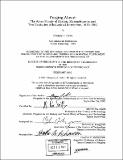Forging ahead : the Ames family of Easton, Massachusetts and two centuries of industrial enterprise, 1635-1861
Author(s)
Galer, Gregory
DownloadFull printable version (19.44Mb)
Alternative title
Two centuries of industrial enterprise, 1635-1861
Other Contributors
Massachusetts Institute of Technology. Program in Science, Technology and Society.
Advisor
Merritt Roe Smith.
Terms of use
Metadata
Show full item recordAbstract
This dissertation uses the Ames Family of Easton, Massachusetts as a case study on development of business and industry in early nineteenth century America. From English iron-working roots transplanted to America in 1635 the artisan tradition of blacksmithing dominated the Ames family for generations. Oliver Ames was trained as a smith, but when he came to Easton in 1803 to focus on the manufacture of shovels, he made an important step in the evolution from artisan and craftsman to industrialist, a common transition well exemplified by Oliver Ames's life. The Ames story demonstrates that the "Industrial Revolution" was no revolution at all. It was a gradual and fluid evolution from one way of doing business to another, an evolution in which many older methods and beliefs (the importance of farming, the dependence on kin, devotion to the community, conservative capital investments...) served men like Oliver Ames well. Common mischaracterizations of industrial development as revolutionary slights the importance of early nineteenth century industry; encourages an inaccurate focus on the romantic nature of small, rural mills; and discourages any impulse to examine in detail the ways in which early industry operated and played a part in industrial development. In fact, the management and operation of many of these facilities was far more complex than is typically recognized. Many of the earliest industrialists struggled to understand and manage complicated issues such as labor, raw materials, shipping, sales, international trade, economics, technological and scientific understanding, and the impact of business on family and community. (cont.) We can learn much about later business practice by exploring these earlier industries. The thesis discusses Oliver Ames's operations in Easton, West Bridgewater, and Canton, Massachusetts including joint waterpower development. Later management by Oliver's sons Oakes and Oliver is also studied as are merchant houses in New York and blast furnaces in Franklin and Wawayanda, New Jersey managed by Old Oliver's son William and the puddling and heavy forging shop run by his son Horatio in Falls Village, Connecticut. Later family investments are briefly discussed including Oakes's involvement with the Credit Mobilier Construction Company which built the Union Pacific Railroad.
Description
Thesis (Ph. D.)--Massachusetts Institute of Technology, Program in Science, Technology and Society, February 2002. Includes bibliographical references (p. [312]-323).
Date issued
2002Department
Massachusetts Institute of Technology. Program in Science, Technology and SocietyPublisher
Massachusetts Institute of Technology
Keywords
Program in Science, Technology and Society.